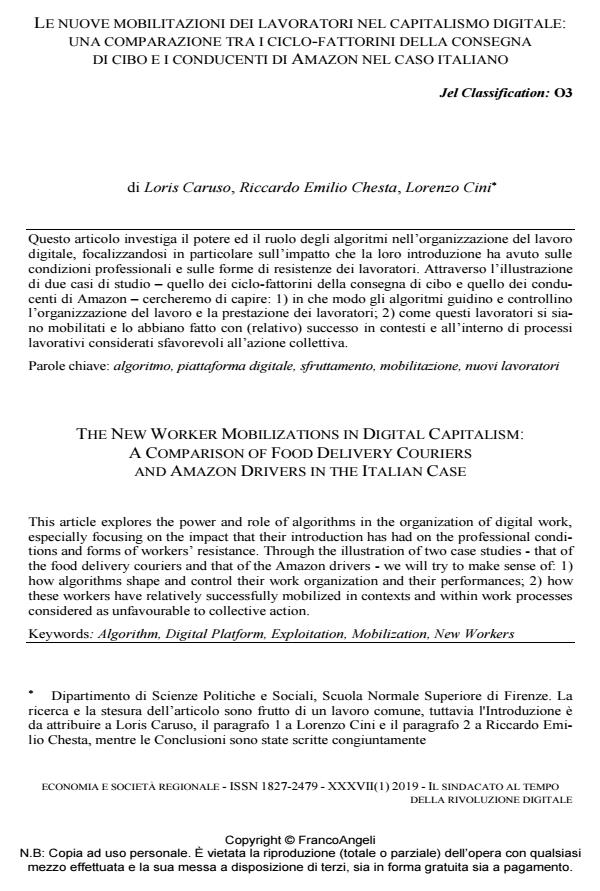The new worker mobilizations in digital capitalism: a comparison of food delivery couriers and amazon drivers in the italian case
Journal title ECONOMIA E SOCIETÀ REGIONALE
Author/s Loris Caruso, Riccardo Emilio Chesta, Lorenzo Cini
Publishing Year 2019 Issue 2019/1
Language Italian Pages 18 P. 61-78 File size 292 KB
DOI 10.3280/ES2019-001006
DOI is like a bar code for intellectual property: to have more infomation
click here
Below, you can see the article first page
If you want to buy this article in PDF format, you can do it, following the instructions to buy download credits

FrancoAngeli is member of Publishers International Linking Association, Inc (PILA), a not-for-profit association which run the CrossRef service enabling links to and from online scholarly content.
This article explores the power and role of algorithms in the organization of digital work, especially focusing on the impact that their introduction has had on the professional conditions and forms of workers’ resistance. Through the illustration of two case studies - that of the food delivery couriers and that of the Amazon drivers - we will try to make sense of: 1) how algorithms shape and control their work organization and their performances; 2) how these workers have relatively successfully mobilized in contexts and within work processes considered as unfavourable to collective action. Keywords: Algorithm, Digital Platform, Exploitation, Mobilization, New Workers
Keywords: Algoritmo, piattaforma digitale, sfruttamento, mobilitazione, nuovi lavoratori
- Incursioni L'inconsistenza dei diritti. Il Grave Sfruttamento del Lavoro migrante in Italia. Introduzione. Dal caporalato al padronato. Riflessioni critiche sul sistema del Grave Sfruttamento Lavorativo Emanuela Abbatecola, Davide Filippi, Marco Omizzolo, in MONDI MIGRANTI 2/2022 pp.9
DOI: 10.3280/MM2022-002001 - Mobilizing against the odds. Solidarity in action in the platform economy Donatella della Porta, Riccardo Emilio Chesta, Lorenzo Cini, in Berliner Journal für Soziologie /2022 pp.213
DOI: 10.1007/s11609-022-00471-z - Relazioni industriali e nuove tecnologie: conflitto, partecipazione e concertazione nell'era del lavoro digitale Matteo Turrin, in ECONOMIA E SOCIETÀ REGIONALE 3/2022 pp.55
DOI: 10.3280/ES2022-003006 - With or without U(nions)? Understanding the diversity of gig workers’ organizing practices in Italy and the UK Lorenzo Cini, Vincenzo Maccarrone, Arianna Tassinari, in European Journal of Industrial Relations /2022 pp.341
DOI: 10.1177/09596801211052531 - The employee paradigm towards proof of work via digital platforms: The situation of Italian platform workers Giacomo Pisani, in Oñati Socio-Legal Series /2023 pp.1903
DOI: 10.35295/osls.iisl.1768
Loris Caruso, Riccardo Emilio Chesta, Lorenzo Cini, Le nuove mobilitazioni dei lavoratori nel capitalismo digitale: una comparazione tra i ciclo-fattorini della consegna di cibo e i conducenti di amazon nel caso italiano in "ECONOMIA E SOCIETÀ REGIONALE " 1/2019, pp 61-78, DOI: 10.3280/ES2019-001006